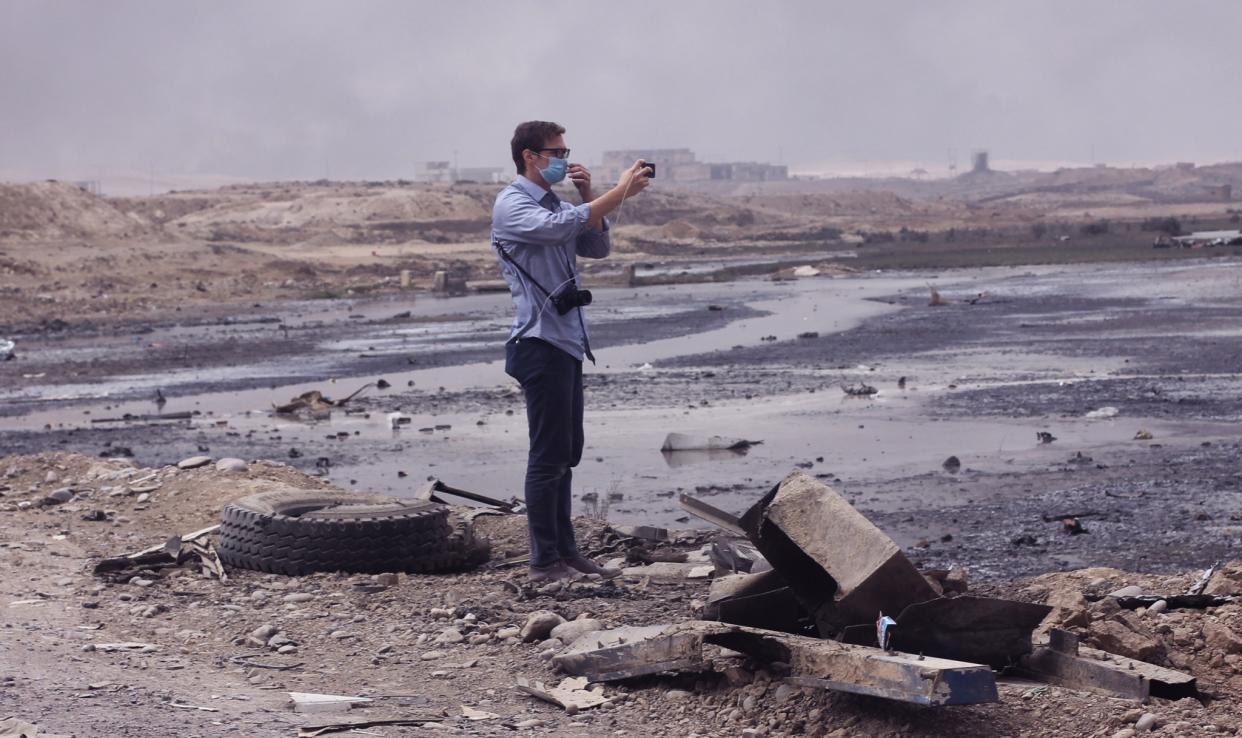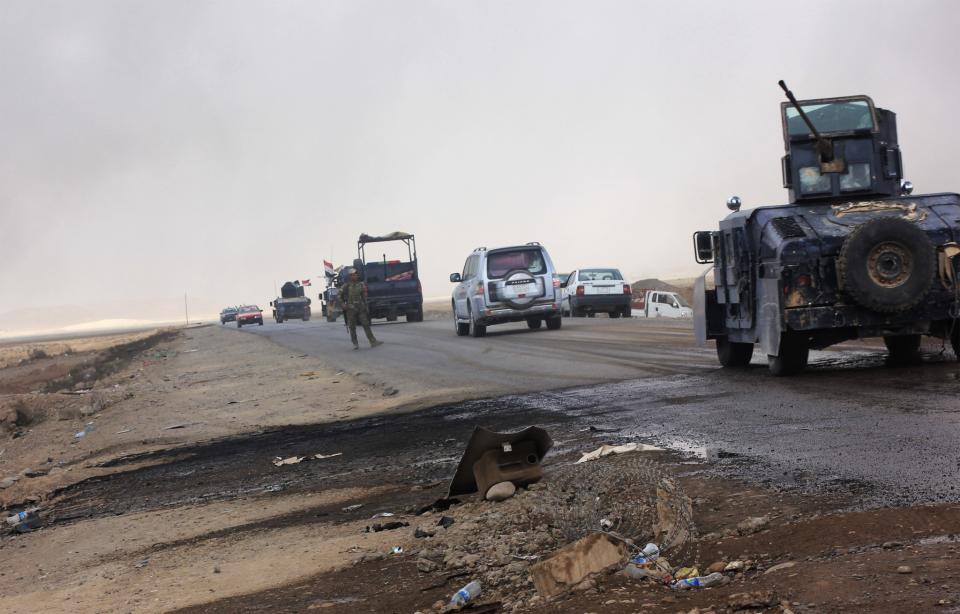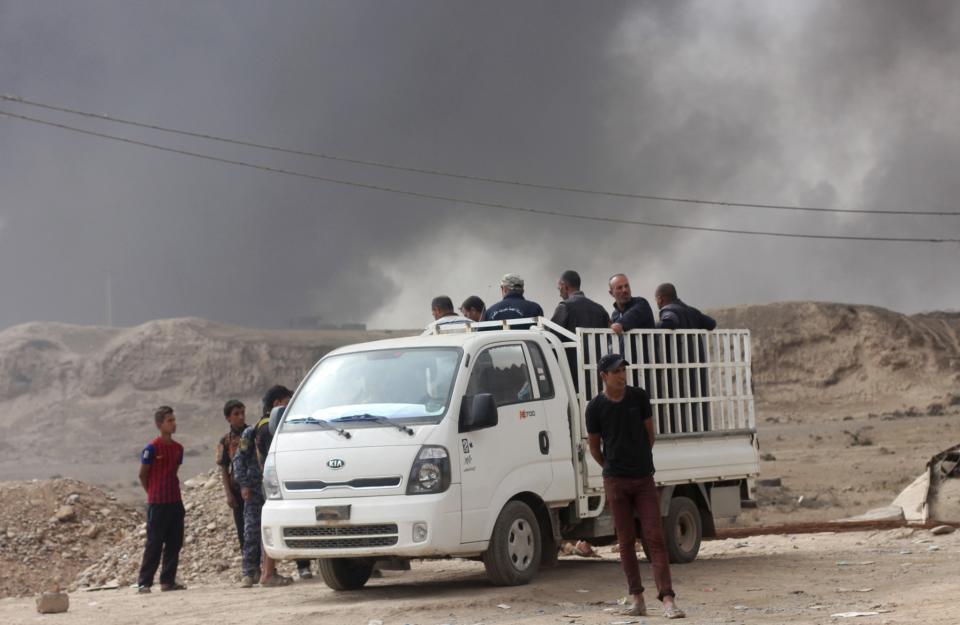In fight for Mosul, aid workers get close to the frontlines to help civilians fleeing ISIS

Northern Qayyara, Iraq — The smoke rose at the edge of northern Qayyara, just over 40 miles south of Mosul in Iraq.
The oil refineries the Islamic State set on fire in late August are still burning. The smoke, combined with fumes from the sulfur plant set on fire by ISIS just over a week ago, along with a dust storm, has created a cloud of toxic particles human lungs were never meant to inhale.
The dust and smoke obscured the blue skies and changed the light, obscuring everything with black dust.
But as the fighting in Mosul intensifies, a humanitarian crisis is unfolding, and nongovernmental organizations like Preemptive Love Coalition (PLC) are scrambling to locate fleeing civilians and provide them with emergency food, shelter and water.
The International Organization of Migration (IOM) told Yahoo News in an email that more than 20,000 people have been displaced since the start of the operation in October. And according to a report sponsored by the United Nations, at least two-thirds of them have fled south toward Qayyarah.
Earlier this week, Jeremy Courtney, founder of PLC, surveyed the group’s efforts in the Qayyarah area, where he hopes to set up an aid station to provide emergency assistance to civilians before they are transported to camps or other resettlement areas. He expects the organization will have nearly 20,000 people come through per month.
Yahoo News traveled with Courtney and Matt Willingham, senior field media director for PLC, as far north as newly liberated town of Shura, retaken from ISIS just a few days ago. Yahoo News was the first Western media outlet to be allowed into the village.
—

Before arriving at the northern Qayyarah checkpoint, Courtney wanted to stop at PLC’s warehouse to check on supplies. Bags of rice and other food items were stacked against the walls on either side of the room. The organization has managed to provide supplies for a few villages south of Mosul since the operation began, but they are working to restock for the aid-station project.
The small warehouse had been used to build and store bombs under ISIS occupation. Bullet holes pierced the doors and walls from an exchange of fire between ISIS and Iraqi forces.
“This warehouse space, just weeks ago was being used by ISIS,” Courtney reported to some of his supporters by iPhone video. “[They] worked inside this exact building making bombs. … So as they’ve been driven out, we’ve actually come in and redeemed this place and now using it to prepare food.”
After reviewing the warehouse inventory, Courtney was ready to move on to the aid station site at a checkpoint in northern Qayyarah.

At the checkpoint, the Iraqi forces could be seen spread out along the road. Dozens of internally displaced persons, or IDPs, were pulled aside for screening and told to wait. Some were waved on.
Workers on one side the road were measuring out an area for the aid tent. Dirt lay in piles where the tent was planned, and metal grids to support it were lying on the ground. By Thursday, the tent had been erected.
On the horizon, the smoke grew worse. Almost no one had his mouth or nose covered.
During the battle for Shirquat in September, PLC had been invited by the Iraqi military who had an interest in humanitarian efforts to set up tents where civilians were vetted before leaving hostile areas to make sure they did not have links to ISIS. At the aid station, people could receive a hot meal and a basic medical examination.

“That seemed to work really well,” Willingham told Yahoo News, “They [Iraqi forces] named it the ‘peace center’ in Arabic, and the idea was, This is a place where you’re a person, period. We worked it out with the military and Hashd [Shia militias] that no sectarian flags of any kind would be flown, only the Iraqi flag.”
Human rights groups have raised concerns over the tribal militias’ treatment of civilians who don’t share the same ethnic or religious background.
—
Driving further north toward Shura, the roads were eerily quiet. There were potholes from mortars. Burned-out cars, which appeared to have been used for suicide bombings, sat on either side of the road. And military vehicles drove by but there were no civilians.
At the entrance of Shura, Iraqi federal police were guarding the village on high alert.
Willingham and Courtney both stepped out of the car to take photos and to talk to the guards about the safety of the village.

When asked where the had civilians fled, one of the guards said, “They all fled with ISIS, they were sympathizers.”
He wasn’t willing to let anyone in due to security concerns, but then a caravan of commanders arrived. After a few minutes of introductions and explanation, the commanders invited PLC staff into the village safe house.
Celebratory gunfire was heard in the distance, and the streets were strewn with dead bodies — ISIS fighters, according to the commanders.
When Courtney asked if the bodies would be removed, one of the commanders said flatly, “That’s not our job, that’s what the dogs are for.”
He led us into a safe house inside the village, offered us water and Iraqi sweets.
The federal police chief Raed Shaker Jawdat was sitting in the front of the room and welcomed PLC. In return, Courtney thanked him and his officers for pushing back ISIS.
The lights in the house flickered while PLC explained their mission. Jawdat said that his men had sent civilians south. They had given civilians 24 hours to leave during operations and then put those remaining on trucks to relocate them.

Courtney later said, “That is in direct conflict with rumors that everyone in the city was an ISIS sympathizer and therefore fled with ISIS. It’s those unhelpful generalizations of an entire population that make humanitarian work and reconciliation extremely difficult.”
—
PLC anticipates the newly erected tent will hold at least 200 people at a time.
PLC’s humanitarian missions have faced steep financial challenges, Courtney said. He explained that the “cost of concrete [is] going up, the cost of transportation is going up, [and] as checkpoints cause delays, drivers decide they don’t want to sit a checkpoint an entire day without getting compensated for it, so now all the prices rise together.”
As IDPs move out of Mosul and head south, those who are not transported by military caravans will be looking for a safe community until they can return to their homes. Camps for IDPs are only beginning to be set up in the area.
A spokesperson for IOM told Yahoo News; “We’re currently building two emergency sites in Qayyarah, one at Qayyarah airstrip and the other at Hajj Ali, with initial accommodation for over 100,000 people.” (Haj Ali is a village situated just south of Qayyara.)

While some aid is starting to move in, Courtney said he still believes in getting aid to IDPs right where they are, “We continue to work to go out past the gates of safety to reach those people who are fleeing violence. We don’t think it’s appropriate to sit inside the safety of city gates and make the most vulnerable people reach you. We’re the ones who should be going through hurdles.”
For those escaping Mosul, their life is on the line and surviving ISIS isn’t their only concern. There are still the environmental toxins, the threat of dehydration and the impending winter.
_____
Ash Gallagher is a multimedia journalist covering the Mideast for Yahoo News.



